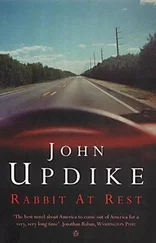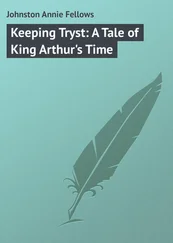This fragile, misbegotten nation had a history scarcely expressed in the grandiose New Prospect City Hall and the lake of developers' rubble on whose opposite shores stand, with their caged windows, the high school and the sooty black church. Each town bears in its center relics of the nineteenth century, civic buildings of lumpy brown stones or soft red brick with jutting cornices and round arched entryways, ornate proud buildings outlasting the flimsier twentieth-century constructions. These older, ruddier buildings express a bygone industrial prosperity, a wealth of manufacture, machinery and railroads harnessed to the lives of a laboring nation, an era of internal consolidation and welcome to the world's immigrants. Then there is an underlying earlier century, which made the succeeding ones possible. The orange truck rumbles past small iron signs and over-lookable monuments commemorating an insurgency that became a revolution; from Fort Lee to Red Bank, its battles had been fought, leaving thousands of boys asleep beneath the grass.
Charlie Chehab, a man of many disparate parts, knows a surprising amount about that ancient conflict: " New Jersey 's where the Revolution got turned around. Long Island had been a disaster; New York City was more of the same. Retreat, retreat. Disease and desertions. Just before the winter of 'seventy-six-'seventy-seven, the British moved down from Fort Lee to Newark, then to Brunswick and Princeton and Trenton, easy as a knife through butter. Washington straggled across the Delaware with an army in rags. A lot of them, believe it or not, were barefoot. Barefoot, and winter coming on. We were toast. In Philadelphia, everybody was trying to leave except the Tories, who sat around waiting for their buddies the redcoats to arrive. Up in New England, a British fleet took Newport and Rhode Island without a fight. It was over. "
"Yes, and why wasn't it?" Ahmad asks, wondering why Charlie is telling this patriotic tale with such enthusiasm.
"Well," he says, "several things. Some good things were happening. The Continental Congress woke up and stopped trying to run the war; they said, 'O.K., let George do it.''
"Is that where the phrase comes from?"
"Good question. I don't think so. The other American general in charge, a silly prick called Charles Lee-Fort Lee is named after him, thanks a bunch-let himself be captured in a tavern in Basking Ridge, leaving Washington in total charge. At this point Washington was lucky to have an army at all. After Long Island, see, the British had gone easy on us. They let die Continental Army retreat and get across the Delaware. That proved to be a mistake, for, as they must have taught you at school-what the fuck do they teach you at school, Madman?-Washington and a plucky band of threadbare freedom fighters crossed the Delaware on Christmas Day and routed the Hessian troops garrisoned in Trenton, and took a whole bunch of prisoners. On top of that, when Cornwallis brought down a big force from New York and thought he had the Americans trapped south of Trenton, Washington snuck off through the woods, around the Barrens and the Great Bear Swamp, and marched north to Princeton! All this with soldiers in rags who hadn't slept for days! People were tougher then. They weren't afraid to die. When Washington ran into a British force south of Princeton, an American general named Mercer was captured, and they called him a damn rebel and told him to beg for quarter, and he said he wasn't a rebel and refused to beg, so they bayoneted him to death. They weren't such nice guys, the British, as Masterpiece Theatre lets on. When things looked their worst at Princeton, Washington on a white horse-this is honest truth, on a truly white horse – led his men into the heart of the British fire and turned the tide, and ran after the retreating redcoats shouting, 'It's a fine fox chase, my boys!' "
"He sounds cruel," Ahmad said.
Charlie made that negative American noise in his nose, aahnn, signifying dismissal, and said, "Not really. War is cruel, but not the men who wage it necessarily. Washington was a gentleman. When the battle at Princeton was over, he stopped and complimented a wounded British soldier on what a gallant fight they had put up. In Philadelphia, he protected the Hessian prisoners from the pissed-off crowds, who would have killed them. See, the Hessians, like most professional European soldiers, were trained to give quarter only in certain circumstances, and to take no prisoners otherwise-that's what they did on Long Island, they butchered us-and they were so amazed at the humane treatment they got instead that a quarter of them stayed here when the war was over. They intermarried with the Pennsylvania Dutch. They became Americans."
"You seem very enamored of George Washington."
"Well, why not?" Charlie considers, as if Ahmad has sprung a trap. "You have to be, if you care about New Jersey. Here's where he earned his spurs. The great thing about him, he was a learner. He learned, for one thing, to get along with the New Englanders. From the standpoint of a Virginia planter, the New Englanders were a bunch of unkempt anarchists; they had blacks and red Indians in their ranks as if these guys were white men, just like they had them on their whaling ships. Washington himself, actually, for that matter, had a big black buck for a sidekick, also called Lee, no relation to Robert E. When the war was over, Washington freed him for his services to the Revolution. He had learned to think of slavery as a bad thing. He wound up encouraging black enlistment, after resisting the idea initially. You've heard the word 'pragmatic'?"
"Of course."
"That was Georgie. He learned to take what came, to fight guerrilla-style: hit and hide, hit and hide. He retreated but he never gave up. He was the Ho Chi Minh of his day. We were like Hamas. We were Al-Qaida. The thing about New Jersey was," Charlie hurries to add, when Ahmad takes a breath as if he might interrupt, "the British wanted it to be a model of pacification-winning hearts and minds, you've heard of that. They saw what they did on Long Island was counterproductive, recruiting more resistance, and were trying to play nice here, to woo the colonists back to the mother country. At Trenton, what Washington was saying to the British was, 'This is real. This is beyond nice.' "
"Beyond nice," Ahmad repeats. "That could be the title of a TV series for you to direct."
Charlie doesn't acknowledge the playful idea. He is selling something. He goes on, "He showed the world what can be done against the odds, against a superpower. He showed- and this is where Vietnam and Iraq come in-that in a war between an imperialist occupier and the people who actually live there, the people will eventually prevail. They know the terrain. They have more at stake. They have nowhere else to go. It wasn't just the Continental Army in New Jersey; it was the local militias, little sneaky bands of locals all across New Jersey, acting on their own, picking off British soldiers one by one and disappearing, back into the countryside-not playing fair, in other words, by the other guy's rules. The attack on the Hessians was sneaky, too-in the middle of a blizzard, and on a holiday when not even soldiers ought to have to work. Washington was saying, 'Hey, this is our war.' About Valley Forge: Valley Forge gets all the publicity, but the winters after that he camped out in New Jersey-in Middlebrook in the Watchung Mountains, and then in Mor-ristown. In Morristown, the first winter was the coldest in a century. They chopped down six hundred acres of oak and chestnut trees to make huts and have firewood. There was so much snow that winter the provisions couldn't get through and they nearly starved."
"For the state of the world now," Ahmad offers, to get in step with Charlie, "it might have been better if they had. The United States might have become a kind of Canada, a peaceable and sensible country, though infidel."
Читать дальше












